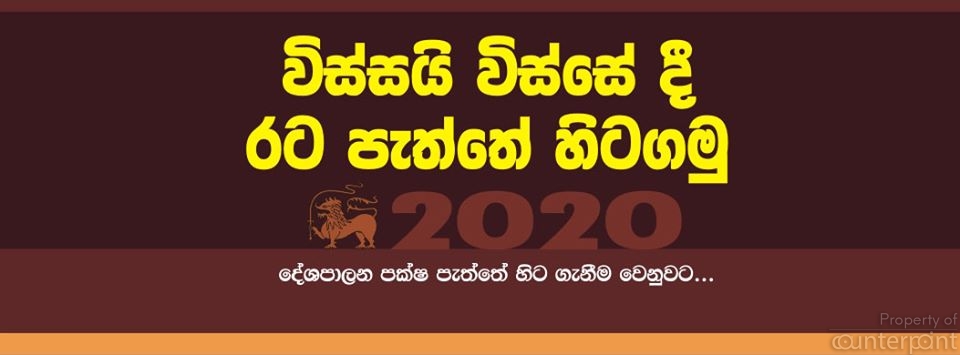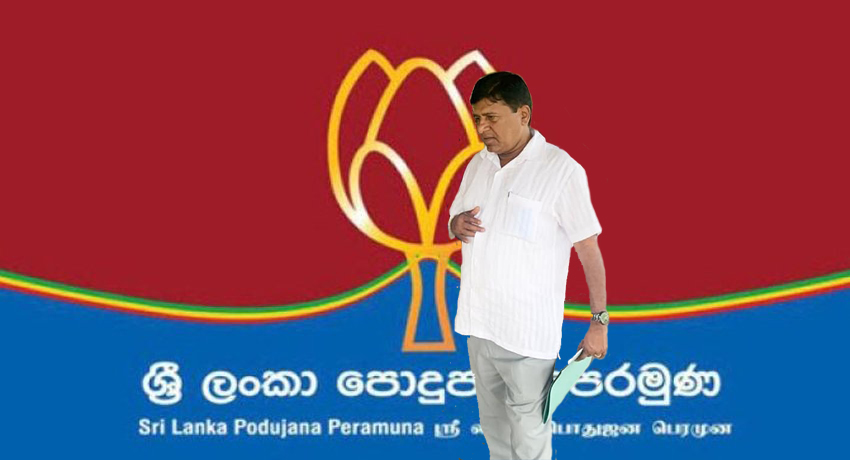Chintaka Tillekeratne is contesting the forthcoming parliamentary election for the first time. While he and several of his group are contesting under the National Peoples’ Party (NPP), they represent the Dharmapala Parapura (Dharmapala Generation following the teachings of Angarika Dharmapala).
‘In 2020, Let’s Stand on the Side of the Country, Instead of on the side of Political Parties,’ goes their slogan and Chintaka told Counterpoint that the group’s campaign is mostly conducted on-line. Formed under the patronage of the Ven. Prof. Indragare Dhammaratana Thero of the University of Kelaniya, Dharmapala Parapura offers certificate and diploma courses on the Angarika’s teachings. It evolved into a political party more recently, said Chintaka who explained that they are contesting with the NPP as they had not been able to register the party before the parliamentary election was called. There are four members contesting from Colombo and one from Anuradhapura. Chintaka is in his forties and is an IT professional. Other contestants from the group are Dermatologist, Dr. Asoka Kamaladasa, Engineer Lasmantha Wasalage, and Journalist Lakmal Nanayakkara and their motto is Patriotism with knowledge and professionalism.

In a chat with Counterpoint Chintaka elaborated on their plans:
Counterpoint: How did the Dharmapala Parapura evolve into a political group?
Chintaka Tilekeratne: Our group focussed on promoting a more home based, organic and indegenous approach to life; for instance we raised awareness that the Mee Tree (botanical name -Madhuca Longifolia-Sapotaceae) is a natural form of fertilizer and is therefore the national tree for that purpose. In ancient times farmers did not use chemical fertilizer. We promote a return to eating locally produced food, and following a more indigenous life-style, better protection of our environment etc. but we must also be educated about what is going around us and world trends. We are a not-for-profit outfit. Over time, we realized that there were many gaps in the manner in which the country is administered and felt that we could fill that vacuum if we move our activity into the political arena.
Counterpoint: You say your group’s campaign is different to other political parties. How do you stand out?
CT: Our campaign is carried out electronically. We do not use posters, flags or hold rallies. We are not interested in showing our might by having large crowds attend our meetings. For other political parties, showing numbers at rallies is important, though they tend to forget those people once they win power. Today we see that campaigns are carried out on the popularity of a person, and the power of money, not on the ideologies of a party. Also since we have not relied on campaign rallies to get our message across, I see an advantage in reaching people electronically. Our campaign in Colombo is shaped to attract those living in the city while the Anuradhapura campaign focusses on what appeals to those residents.
Counterpoint: You say you are focussing on being more indigenous. Can you expand on that?
CT: We are a country that depends on foreign goods and ideas for everything. Be it vehicles, technology, food, we prefer what is manufactured overseas instead of producing those things ourselves or looking for local substitutes. Must we eat Dhal or depend on wheat flour? Can’t we go for a locally produced substitute? Why is that we do not have our own social-media Network and rely on a foreign web-mail? China has its own domain, why can’t we do the same? Why should we rely on brand names?
Counterpoint: But locally produced goods are usually more expensive than imported varieties. For instance there is a trend to wear handloom products; however, the Indian handloom is often cheaper. It is the same with locally produced food. How will you work around that?
CT: That is correct, and the reason is because there has been no attempt to resolve the issue of the middle-man. The Producer never gets a fair price and the consumer pays far more for the product, money that should actually go to the producer. You can see our plans in our manifesto which was released on July 5. We plan to conduct all internal production and marketing along the co-operative concept.
Counterpoint: If you are successful, you will be a first time parliamentarian. How do you see your role? There is a call to reject all 225 parliamentarians; your thoughts?
CT: When a person enters parliament, that person’s role changes, and parliamentarians must understand that. Doing politics at local level is about resolving issues of constituents and helping out with their everyday issues. But in parliament one must look at issues and policies from a national point of view.
I also believe that 225 parliamentarians is far too many. Ideally it should be limited to 60, and certainly nothing more than a 100.
Counterpoint: What are your thoughts about the current political system?
CT: In the current scenario it is more about individual popularity over political party. It seems that a political party is just a legal requirement and personal popularity is more important. At the same time, people are unable to vote for the individuals they prefer if they are not in the same party, because you have pick contestants from the same party. We need to explore whether the party system suits us anymore. Can a different method be introduced to select suitable candidates?
Counterpoint: What is your group’s perspective on minority communities and their demands?
CT: There have been minority communities living in Sri Lanka since ancient times though with time divisions have occurred owing to the various reforms implemented during Colonial rule. It is important that minority communities integrate with the rest of the population. There are divisions amongst those communities too and Minorities also are caught up by external influences and act as though they have one foot here and the other there. That is why it is important that we infuse in everyone the idea that we must all come together. What we need is co-existence not reconciliation.
Counterpoint: What form of governance should Sri Lanka adopt?
CT: We believe that all signs of federalism in governance should be removed. There should be one law that is applicable to all and that must come from the Centre. When power is devolved, the unitary state disappears. Those who promote federalism are just lambs in wolves clothing. It is a means of increasing powers to the provinces. The Thesavalamai, Kandyan, Muslim Marriage and Divorce laws, and province or community specific laws too must be done away with.





